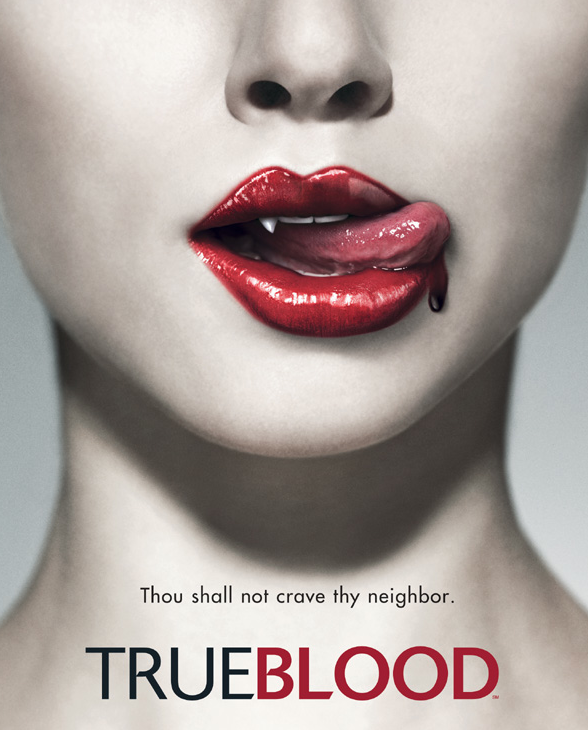True Blood (2) and the Culture of Vampires
Vampires have become an important part of our current cultural milieu. They exist in various guises and over a number of different media. This is not an accident but a reflection of the zeitgeist that we are living in.
Various commentators have suggested that the reappearance of vampires both as heroes and villains of numerous books and films and television shows suggests an obsession with immortality. Others have referenced Bram Stoker's Dracula which was published in 1897. There are further references to the folkloric origins of the vampire both as metaphor and myth. Combine all of this with further references to the supernatural, the church, demons and monsters and reality seems to be a rather boring and mundane place. And that is precisely the point.
The 'undead' appear in all cultures and there is an obsession with the afterlife in most religions. Vampires don't so much reference immortality as they do history. One of the characters in True Blood, Eric is over a thousand years old. We even see him on the battlefield moments before he is killed by his 'maker' and becomes a vampire. Presumably, since vampires can be anywhere on the earth, they are not only immortal but all knowing. Their knowledge does not let them change their reality. They are stuck inside and outside of history.
However, modern stories of vampires are less transparent, with the vampires actually experiencing some measured conflict not only about their status, but also about their state of mind as well as their emotions. This was brought to the foreground in Buffy the Vampire Slayer with the vampire character of Angel. Somewhat like Bill Compton in True Blood, Angel falls in love with a human and the entire show circles around the existential angst that Buffy and Angel experience as their emotional attachment ebbs and flows. These shows are also connected to the endless procession of TV series which use the supernatural to solve mysteries and murders as in The Mentalist or where the supernatural becomes a source of danger as in Heroes.
The roots of superstition are complex and profoundly intertwined with paganism and spiritualism. One of the most important psychological elements in superstition is projection. Something or someone outside of oneself is responsible not only for our state of mind but for the events in our lives. This sense that control has been lost and that it will be very difficult to regain control is at the heart of nearly all the modern stories that have vampires as their main characters.
Vampires can only reproduce by killing and can only survive on more killing. That sounds a lot like modern definitions of terrorism and is a fair definition of war in general. But, the real underlying fear here is that our society has fallen into a cycle defined as much by anarchy as by societies that no longer clearly know which direction they are headed in and why conventional solutions to differences and crises lead nowhere.
Vampires reflect a deep and embedded nihilism that displaces responsibility for what is happening in the world onto someone else living or dead. After all, from global warming to terrorism to economic collapse, these are not the best of times. Vampires of course cannot see the sun and natural light is their enemy. Darkness, the time of nightmares and dreams and of danger and fairy tales is when they rule.
True Blood which is a critique of vampires and religion and actually links the two is also a brilliant exploration of what happens when magic and sorcery do in fact take over. The results range from endless loss to hope in the midst of decay. In True Blood, the rather medieval charms of shapeshifting are added to the more sinister challenges of witchcraft. In all cases, the universe is out of control and people, normal people if there are any, are always confronting monsters within and without.
The vampires in True Blood actually have a centralized governing structure with a hierarchy and clearly laid out responsibilities. The fact that the male and female vampires can make love to humans even though they are 'dead' suggests quite optimistically that even in a dystopic time sex and love don't die. This is also the central thematic of the Twilight series by Stephanie Myers.
All of this is fundamentally an attack on modernism, on change and on societies which seem to have lost any connections to their roots. There is a deep nostalgia in Bill Compton's face and demeanor. He wants love even though he is dead. He wants to have an impact on a society that discriminates against him. He wants truth where there are only lies. He is charmingly naive and cynical at the same time. He is both young and profoundly aged. He can magically appear from nowhere and move at the speed of light. But, none of this changes the profoundly decayed society that he inhabits. The circle of fear and retribution will only repeat itself. He is history's worst enemy. A great deal is learned only to be lost over and over again. This timeless world of ghosts and screams and fear represents the apotheosis of contemporary angst. Once again as with Six Feet Under, Alan Ball the creator and director of True Blood is a true historian of our times.

